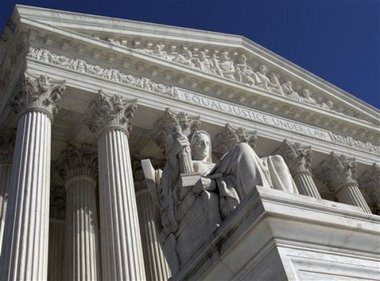
Does a church have the right to hire or fire the preacher without worrying about government interference?
If a Catholic priest decides he doesn’t accept the authority of the Pope, can the diocese recall him without worrying about the National Labor Relations Board? Can the local Baptist church fire a youth minister who announces he speaks in tongues and all the high schoolers will go to hell if they don’t?
While the question seems obvious, it goes before the U.S. Supreme Court next week with a bit of a twist. Does the same “ministerial exception” apply to other employees? During the opening week of its new term, the court will hear oral arguments in what some observers say is the most important religious liberty case in decades — Hosanna-Tabor Evangelical Church and School v. Equal Employment Opportunity Commission.
In question is a 40-year-old constitutional doctrine known as the “ministerial exception.” It’s an interpretation of the First Amendment guaranteeing that the government may not meddle in the free exercise of religion.
The question before the justices, writes Lauren Markoe for the Washington Post, is whether the exemption protects churches and other religious institutions from government interference in their employment decisions:
Few would dispute that a religious congregation should be unfettered when it chooses to hire or fire clergy. But what about other church employees?
“Advocates for the ministerial exception argue that religious institutions, in their hiring and firing, should be regulated as little as possible,” said Ira C. Lupu, a professor at The George Washington University School of Law who specializes in church-state cases. “On the other side are those concerned that a particular group is cast outside the various protections of civil rights laws.”
“The doctrine upheld by lower courts for four decades protects religious organizations,” writes Hannah C. Smith for Salt Lake City’s Deseret News , “by exempting them from certain employment rules (anti-discrimination laws) relating to their ‘ministerial employees.’ The doctrine reflects the long-standing recognition of church autonomy in hiring and firing ministers without government interference.”
The issue is not as simple as it might seem, notes Smith, who clerked at the U.S. Supreme Court and is a member of the Deseret News’ editorial advisory board. She is also senior counsel at the Becket Fund for Religious Liberty, which will appear before the court in the case. She notes:
This freedom enables the church to define and control its leadership, beliefs, character and message. The question the Supreme Court will consider is who counts as a “ministerial employee” and thus whose employment status is within the sphere of the church’s autonomy.
Hosanna-Tabor Evangelical School is a small, church-run evangelical Lutheran school in suburban Detroit. Its former fourth grade teacher— Cheryl Perich — was hired to teach an academic curriculum. But she was also hired to teach her students religion classes, lead class prayer, lead scriptural devotionals, attend school-wide chapel services with her class, infuse religion into the secular subjects she taught and be a good Christian role model to her students. In short, her job was to instill the Lutheran faith in the next generation in her classroom.
Perich took an extended leave of absence because of illness. The church hired a replacement. Following church doctrine based on 1st Corinthians, chapter 6, the church requires members and employees to follow an internal procedure for disputes.
“So when Perich threatened to take the church to court” instead of following the internal procedure, “she did so contrary to church teaching,” writes Smith. “The church released Perich from her call as a commissioned minister and teacher for insubordination and disruptive conduct in violation of church teachings.”
But can they do that? She filed a discrimination claim with the Equal Employment Opportunity Commission — seeking to be reinstated as a teacher at the school — over the objections of the church that runs the school. The church says that she was a “ministerial employee” and that her defiance of the church’s belief in resolving religious disputes out of court justified firing her.
A trial court ruled in the church’s favor. An appeals court sided with Perich.
Why is this big? Smith observes:
The Supreme Court long ago recognized that government may not tell churches whom to choose as their clergy, or how to transfer power from one leader to another, or whether to reinstate a religious leader who has been found unfit by the church. Courts may not reverse decisions made by religious tribunals or choose sides in a religious controversy. And the Supreme Court has been right.
If the First Amendment means anything, it means that the government is entirely incompetent to decide matters of religious faith, doctrine and practice.
Indeed, because of that constitutional protection written into the Bill of Rights, Mormons can require that their missionaries be Mormons, Lutherans can refuse to put Hindu priests in their pulpits and the Catholic Church can require that all nuns be female.
Smith notes:
If, as the EEOC urges, the Supreme Court decides the ministerial exception should not exist at all, the floodgates open for lawsuits claiming all sorts of “discrimination” by religious institutions that heretofore had been accepted as a legitimate form of religious expression.
More likely, the Supreme Court will recognize the danger of eliminating that exception and will uphold the doctrine as grounded in our constitutional history and applicable to the teacher in this case. Whatever the outcome, the decision will likely have a significant impact on the level of autonomy of many religious institutions in this country.

